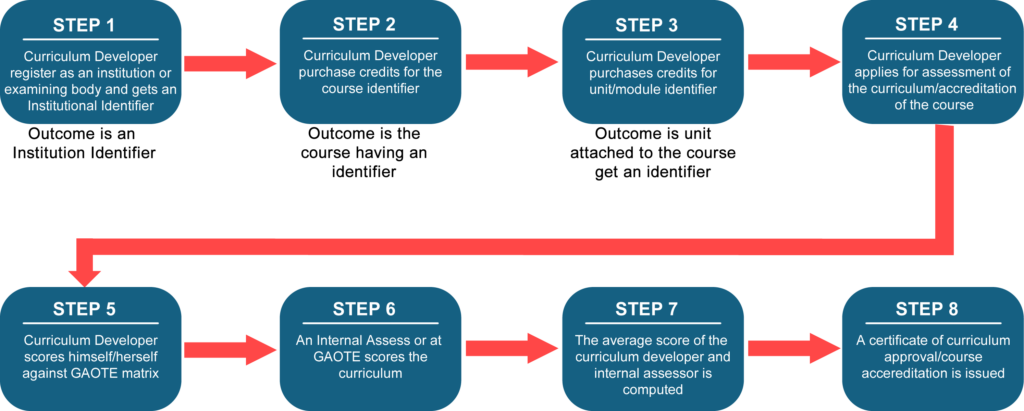Need for Global Accreditation of Courses
The Global Association of Online Trainers and Examiners (GAOTE) is a non-profit organization that aims to democratize online education by providing accreditation to online academic institutions that meet its quality standards. GAOTE recognizes that online education is a powerful tool for expanding access to learning opportunities, especially for those who face barriers due to location, cost, or other factors. However, online education also faces challenges in terms of recognition and authentication of online certifications in the global skills market. GAOTE seeks to address these challenges by establishing a rigorous and transparent accreditation process that evaluates the curriculum, faculty, assessment, and student support services of online academic institutions. By doing so, GAOTE hopes to enhance the credibility and reputation of online education, as well as the employability and mobility of online learners.
The Gap
- GAOTE fills a gap that is not addressed by national accreditation bodies, which often fail to acknowledge the quality and relevance of online courses offered by trainers and institutions from different countries and regions.
- National accreditation bodies tend to focus on local standards and regulations, which may not reflect the global best practices and expectations of online education.
- Moreover, national accreditation bodies may not have the expertise or the resources to evaluate online courses that cover a wide range of topics and disciplines, from languages and cultures to business and technology.

Benefits of GAOTE Accreditation
- By obtaining GAOTE accreditation, online course providers can demonstrate their commitment to excellence and innovation in online education, as well as their alignment with the global standards and criteria established by GAOTE.
- GAOTE accreditation can also help online course providers to increase their visibility and credibility in the global market, attract more learners and partners, and foster a culture of continuous improvement and quality assurance.
GAOTE and Sustainable Development Goals (SDG)
GAOTE believes that its accreditation initiative will also contribute to the achievement of the Sustainable Development Goals (SDGs), which are a set of 17 global goals that aim to end poverty, protect the planet, and ensure peace and prosperity for all by 2030. GAOTE aligns its accreditation criteria with the SDGs, such as
- Goal 4 (Quality Education)
- Goal 8 (Decent Work and Economic Growth)
- Goal 10 (Reduced Inequalities)
- Goal 17 (Partnerships for the Goals).
GAOTE also encourages its accredited institutions to incorporate the SDGs into their teaching and learning activities, as well as their social and environmental impact. By doing so, GAOTE hopes to foster a culture of global citizenship and responsibility among online educators and learners, as well as to promote the values and principles of the SDGs in the wider society.

Curriculum Assessment and Course Accreditation
Flow Chart

Some of the factors/indicators that GAOTE uses to review a curriculum and accredit a course are listed below. GAOTE reserves the right to amend the factors and scores.
Preliminary Guide
- Ensure there is a Preface or Foreword
- Ensure there is an acknowledgement
- Ensure there is mention of either Trend Analysis or Training Need Analysis or Industry Involvement in the design of the curriculum in the Acknowledgement
- Ensure there is detailed information about the submitter
Course Overview and Objectives
Evaluate the clarity and coherence of the course objectives
Ensure alignment between objectives and the overall course goals
Transferability of courses
- Ensure that the number of contact hours are clearly indicated
- Ensure that the number of indirect/non-classroom hours are clearly indicated
- Ensure that the credit hours can easily be calculated
Content and Syllabus
- Review the comprehensiveness and relevance of the content covered
- Assess the sequence and organization of topics in the syllabus
- Verify that the content meets industry standards and reflects current best practices
Preliminary Guide
- Ensure there is a Preface or Foreword
- Ensure there is an acknowledgement
- Ensure there is mention of either Trend Analysis or Training Need Analysis or Industry Involvement in the design of the curriculum in the Acknowledgement
- Ensure there is detailed information about the submitter
Course Overview and Objectives
Evaluate the clarity and coherence of the course objectives
Ensure alignment between objectives and the overall course goals
Transferability of courses
- Ensure that the number of contact hours are clearly indicated
- Ensure that the number of indirect/non-classroom hours are clearly indicated
- Ensure that the credit hours can easily be calculated
Transferability of courses
- Ensure that the number of contact hours are clearly indicated
- Ensure that the number of indirect/non-classroom hours are clearly indicated
- Ensure that the credit hours can easily be calculated
Learning Materials and Resources
- Examine the quality and diversity of learning materials (e.g., textbooks, articles, multimedia resources)
- Ensure accessibility and availability of resources to all learners
- Evaluate the appropriateness of supplementary materials for different learning styles and needs
Assessment Methods
- Analyze the variety and appropriateness of assessment methods (e.g., exams, projects, presentations)
- Check for alignment between assessment methods and learning objectives
- Assess the clarity and fairness of grading criteria and rubrics.
Language
- Clarity and appropriateness of language used in instructional materials.
- Consideration of language proficiency levels of learners
Pedagogical Approaches
- Evaluate the effectiveness of teaching strategies and methodologies
- Consider the incorporation of active learning, collaborative activities, and real-world applications
- Assess opportunities for student engagement and interaction
Instructor Qualifications and Support
- Review qualifications and expertise of instructors
- Evaluate support systems for instructors, including training and professional development opportunities
- Ensure instructors are accessible and responsive to student needs
Diversity and Inclusivity
- Evaluate the inclusivity of course materials and activities, considering diverse perspectives and experiences
- Assess the provision of support for learners from different backgrounds and abilities
- Ensure the promotion of a respectful and supportive learning environment
Continuous Improvement and Evaluation
- Review mechanisms for collecting feedback from students and stakeholders
- Assess processes for course evaluation and modification based on feedback and assessment data
- Ensure a commitment to ongoing improvement and adaptation to changing needs and circumstances
Accreditation Standards and Compliance
- Ensure the examiner/Institution is accredited by a local regulator
- Verify that the course is accredited by a local regulator
- Verify compliance with accreditation standards and guidelines set by other relevant accrediting bodies or institutions
Student reviews and testimonials
- Verify that the course has adequate online reviews
Costs and value
- Cost of the course relative to the value it provides, considering the depth and breadth of content
- Assess the potential for career advancement
Procedure of accrediting course:
- First step is to create an account which is the same as applying for a free institutional identifier.
- Second step is to log in account you have created as an institution and proceed to request for and pay for course identifier and unit module identifiers for your course
- The third stage is to request for course accreditation by clicking on the button “get accredited”.
- The fourth step is to fill in the notional hours of the course to enable calculation of credit hours. Notional hours is the total of all the direct and indirect hours required to complete a course and includes face to face lecture hours, virtual classes, videos, seminar, workshops, self study, assignments, assessments and industrial attachment. A standard rate of 10 notional hours =1 academic credit is applied.
- The fifth step is to pay for the number of academic credits depending on the category
- The sixth step is to attach the curriculum and start filling the self evaluation questionnaire and indicate the scores on listed course aspects
- The seventh step is to submit the self evaluation questionnaire to GAOTE for a GAOTE assessor to verify and do an separate scoring assessment.
- The eighth step is for a GAOTE assessor to submit his/her score regarding the course. If the average score for both self evaluer and assessors is more than 50%, the accreditation of the course is deemed successful and approved. An accreditation certificate for the course is then made available in the dashboard of the institution which requested the course accreditation. The certificate will denote the name of the course, the course identifier, the institution name and identifier, the number of notional hours and academic credits and the ISCED level.
- If the average score from self evaluation and GAOTE assessor is less than 50%, then the awarding institution/course creator is requested to provide more details to GAOTE until GAOTE is satisfied to give a final approval for credit accreditation.
- The awarding institution can then download the course accreditation certificate and display it together with the course identifier on the website or social media platform where they offer the course. Anyone who wishes to verify the course accreditation can click on the course identifier and it should terminate in GAOTEs website as proof of validity. The Awarding institution can also use the GAOTE logo next to their course and such a logo should be embedded with the institutional identifier, so as to terminate to GAOTE special page dedicated to the awarding institution